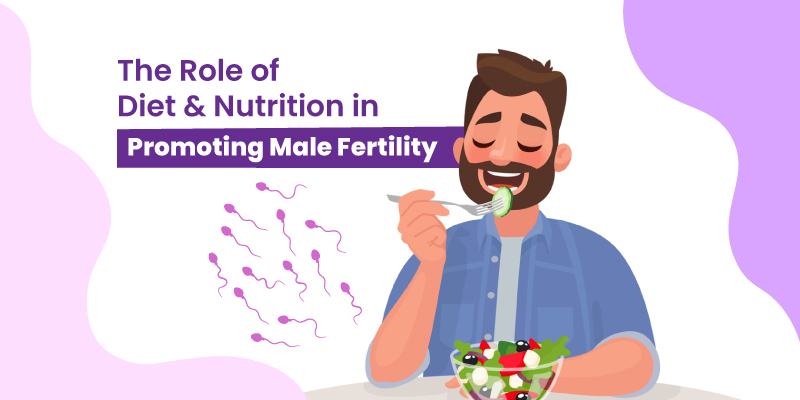Author: Dr Jigna Tamagond, Consultant – Fertility Specialist
Nutrients are the keystone for the molecules that are involved in the proper functioning of the various bodily reactions and systems such as the endocrine system and reproductive system.
Nutrition has an influence on reproductive processes such as spermatogenesis, development of secondary sexual characteristics, reproductive hormone function, etc. Also, it has a significant impact on hormones, and changes in hormonal levels can result in disorders that cause fertility issues. Therefore it is crucial to maintain a proper balance of these nutrients to ensure the controlled functioning of these body systems.
Similar to women, men’s fertility is also influenced by the foods they intake. Fruits and vegetables, processed meats, dairy products, sugars, alcohol, and caffeine all have a significant impact on male fertility. The rising prevalence of overweight and obesity is attributed to unhealthy eating habits, a sedentary lifestyle, and other factors. These are the risk factors for many chronic illnesses, including diabetes, cancer, cardiovascular disease, and male infertility.
Nutrients essential for male fertility:
Zinc:
Zinc is associated with testosterone hormone levels and prostate gland health and is shown to increase fertility by increasing sperm count. Foods rich in zinc are oysters, shrimp, beans, barley, chicken, lentils, green peas, etc.
A deficiency of zinc causes a decline in fertility by reducing testosterone levels.
Folic acid:
Men with reduced levels of folate are more likely to produce sperm with abnormal chromosomes. This increases the risk of miscarriages or congenital abnormalities like Down syndrome. There are higher chances of developing spina bifida due to low folate levels. Folic acid is found in lentil beans and green leafy vegetables.
Vitamin C:
Load on vitamin C as its anti-oxidative nature prevents sperm damage due to oxidative stress. Oranges, lemons, legumes, berries such as blueberries and strawberries, kiwi, papaya, nuts, capsicum, and broccoli are a few foods that are high in vitamin C.

Essential Fatty Acids:
Healthy fats such as omega-3 fatty acids are essential for the human body but in moderation. They are necessary for the formation of the sperm cell membrane. Food sources are fish, fish oils, nuts such as almonds and walnuts, and seeds such as flaxseeds and pumpkin seeds.
Selenium:
It is an essential nutrient for sperm health. It also plays a critical role in mitochondrial function. It is found in Brazil nuts, mushrooms, oats, wholemeal flour, fish, sesame seeds, and egg yolks.
These are only a few essential nutrients that help in promoting male fertility. Consult with a nutritionist to ensure that you are not deficient in the essential vitamins and nutrients before planning a pregnancy. It is also essential to understand that the nutritional requirements vary from person to person.
Steer clear of these foods:
– Foods rich in carbohydrates have a high glycemic index (GI) and low nutritional values. This leads to obesity, type 2 diabetes, and insulin resistance. All these conditions cause a higher risk of fertility issues as they reduce sperm quality.
– Overconsumption of saturated fats such as butter, cheese, foods fried in palm oil, cakes, fatty meat, etc. wreak havoc in the endocrine system and interfere with testosterone production. This has an impact on the spermatogenesis process affecting the sperm structure and sperm count. Reduced sperm count is a common cause of male infertility.
– A high intake of processed foods, including dairy, coffee, alcohol, sugary drinks, and foods containing processed sugars, has been linked to decreased fertility due to low-quality semen.
– Intake of processed meat, especially red meat, has an adverse impact on fertility. It lowers the sperm count and motility.
– Daily consumption of alcohol has detrimental effects on the semen volume and sperm morphology.
– Caffeine is associated with sperm DNA fragmentation.
– Soy products or products that contain phytoestrogens (plant derivative similar to estrogen) should be avoided as they reduce the blood testosterone levels in males.
Bottomline:
As the nutritional status directly depends on the food we eat, proper nutrition is essential for good reproductive health. Making informed lifestyle choices and having healthy dietary patterns have a positive impact on the quality of sperm and the overall health of an individual.


